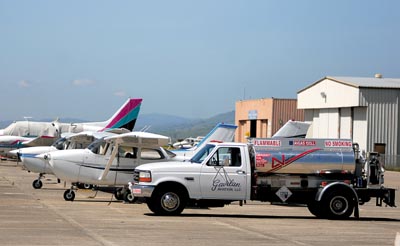
Interim Airport Manager and Code Enforcement Officer Mike
Chambless inspected the Hollister Municipal Airport from front to
back and found several violations, some dangerous, of building and
safety laws.
Interim Airport Manager and Code Enforcement Officer Mike Chambless inspected the Hollister Municipal Airport from front to back and found several violations, some dangerous, of building and safety laws.
He will present his detailed report to the Airport Advisory Commission at 6:30 p.m. tonight at Hollister City Hall, 375 Fifth St.
Chambless was appointed airport manager in February after former Airport Manager Bill Gere departed following a conflict with airport commissioners and city staff. Since his appointment, Chambless has made inspecting the airport grounds and facilities a major priority and said finding and listing the problems was a “long time coming.”
The violations ranged from minor infractions such as storing cars inside rented hangars to more dangerous violations such as improper containers for highly flammable liquids and unsafe construction built inside the hangars. Chambless offered recommendations for fixing the problems including rewording the laws and requiring hangar tenants to pay for repairs and upgrades.
Hazardous material storage: Many hangar tenants were storing hazardous materials improperly, including highly flammable liquids.
Chambless said he will recommend containment vessels for all 55-gallon drums, flame resistant cabinets for storing smaller flammable items and prohibiting refueling of aircraft inside the hangars. He also said the current law is vague in its description of what constitutes “flammable” and the legal description needs to be rewritten to specify the level of flammability for all materials.
Building alterations to hangars: Several hangars were found to have storage areas and additions built without proper permits and they were in violation of safety codes.
Lofts, racks, shelves and an automotive lift were found inside some hangars. Chambless is recommending that the tenants either keep the constructions and modify them to comply with the law at their own cost or have the constructions removed at the city’s cost.
Improper occupancy of storage units: Two storage units were being rented and occupied by an individual. The rooms were lacking proper lease documents as well as basic safety features such as smoke detectors, heat and a proper kitchen. Chambless said, however, these issues were resolved when it was discovered the individual was the airport’s caretaker and the proper documents were filed and the safety and living features were installed.
Personal storage in the hangars: Many hangars were also being used to store miscellaneous items such as holiday decorations, furniture and “recreational items.” California law requires one-hour fire walls for storage of this type, although the current law contains a loophole which allows these items to be stored under certain circumstances.
Chambless is recommending the law be rewritten to strictly prohibit miscellaneous item storage under any circumstance.
Fuel trucks: All six fuel trucks used at the airport are unregistered and uninspected by California Highway Patrol.
In order to comply with the standards, each truck would need to be registered with the California Department of Motor Vehicles, driven to Gilroy and put through a detailed inspection by the CHP. Chambless said because the trucks are used only to drive on airport property at low speeds, he is recommending they be redesignated to avoid having to comply with CHP standards.
Aircraft maintenance: Many hangars were found to contain maintenance supplies such as tools, parts and disassembled aircraft.
California law requires “maintenance” to take place in hangars with one-hour firewalls to guard against damage, a feature none of the hangars possess. Chambless is recommending tenants be required to purchase and install firewalls and sprinklers if they wish to continue maintenance in the hangars.
Insurance requirements: Many tenants were renting hangars with little or no insurance.
Chambless said the city has not specified what type or how much insurance is required and recommends a more specific guideline before tenants are made to comply.
Storage of vehicles in hangars: Many tenants were storing broken vehicles as well as aircraft in the hangars.
Current law prohibits vehicles other than aircraft in the hangars. Chambless is recommending the law be amended to allow these vehicles to continue to be stored.
Improperly stored materials: Many tenants were using the areas around the hangars to store vehicles and items while no rent was paid for the space. Chambless is recommending all tenants be required to move vehicles and other items into their rented hangars and also that any aircraft left for three months or more be in “flight-ready condition.”
Designated travel areas: A lane on the west side of the airport is being used by both ground vehicles and aircraft although under the current law, the lane is designated only for aircraft use. Chambless is recommending the law be rewritten and the lane be designated for both uses.
Apron parking: Parking on the airport’s apron is currently prohibited but rarely enforced.
Chambless said Gere had prohibited the parking but that the parking should be allowed. He is recommending the prohibitions be lifted.









